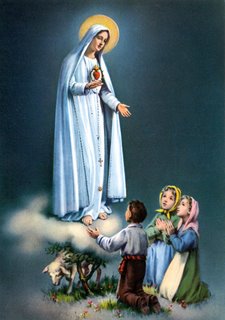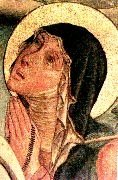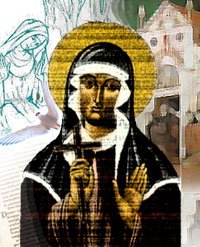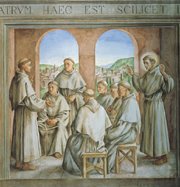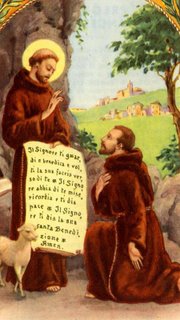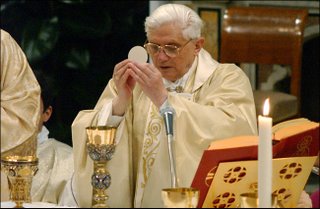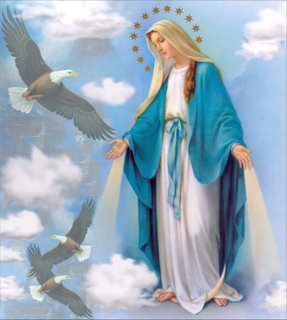
CHAPTER XLII:
'LITTLE FLOWERS' CONTINUED . . .OF SEVERAL WONDERFUL MIRACLES WHICH THE LORD PERFORMED THROUGH THE MEANS OF BROTHER PETER OF MONTICELLO, AND BROTHER CONRAD OF OFFIDA. HOW BROTHER BENTIVOGLIO CARRIED A LEPER FIFTEEN MILES IN A VERY SHORT TIME, HOW ST MICHAEL SPOKE TO ANOTHER BROTHER, AND HOW THE VIRGIN MARY APPEARED TO BROTHER CONRAD AND PLACED HER DIVINE SON IN HIS ARMS
As the sky is adorned with stars, so the providence of the March of Ancona was in former times adorned with holy and exemplary friars, who, like the bright luminaries in heaven, ornamented the Order of St Francis, and enlightened the world by their doctrine and example. Foremost amongst these was Brother Lucido Antico, in whom indeed shone forth the fire of divine charity and the light of holiness; for, taught by the Spirit of God, his preaching produced innumerable fruits. Another brother, Bentivoglio of Severino, was seen by Brother Masseo raised above the earth as he was praying in the forest, at the sight of which miracle Brother Masseo became a Friar Minor, and grew so holy that he worked many miracles, both during his lifetime and after his death: he is buried at Murro. The said Brother Bentivoglio being once all alone at Trave Bonanti, nursing and serving a leper, received an order from his superior to go to another convent fifteen miles off. Not wishing to abandon the poor leper, he placed him carefully on his back, and charitably took him with him. Between the dawn of day and the rising of the sun he accomplished the fifteen miles, and arrived with his burden at the convent to which he had been sent, which was called Monte Sancino. Had he been an eagle he could not have flown as quickly, and such a miracle caused great wonder and surprise in all that country. Another Brother, Peter of Monticello, who was the guardian of the old Convent of Ancona, was raised several feet above the earth, to the foot of the crucifix before which he was in prayer. This same Brother Peter having once observed the Lent of St Michael with great devotion, as he was praying on the last day of the feast in the church, was heard to speak with St Michael by a young man who had hidden himself behind the high altar, in hopes of seeing something wonderful; and the words which he heard were these. The saint said to Brother Peter: “Thou hast suffered faithfully for my sake, and during many days hast mortified thy body; wherefore I am come to comfort thee, and whatever grace thou askest of God, I will obtain for thee.” Brother Peter answered: “Most holy prince of the celestial host of saints, faithful servant of divine love, and pious protector of souls, this is the grace I ask of thee, namely, that thou obtain from God the pardon of my sins.” And St Michael answered: “Ask some other grace, as this I will most easily obtain.” And as Brother Peter asked for nothing else, the Archangel added: “Through the faith and devotion which thou hast to me, I will obtain for thee not this grace only, but many others likewise.” And when the conversation, which had lasted some time, was ended, the Archangel Michael departed, leaving Brother Peter greatly comforted. At the same time lived Brother Conrad of Offida in the Convent of Forana in the custody of Ancona, where resided Brother Peter. Having gone one day into the forest to meditate on God, Brother Peter followed him to see what would befall him; and Brother Conrad began to implore the Virgin Mary, with great fervour and devotion, to obtain from her Blessed Son that he might experience somewhat of the sweetness which St Simeon experienced the day of the Purification, when in his arms he held Jesus the Blessed Saviour. Having finished his prayer, the Virgin Mary obtained his request; and, behold! the Queen of Heaven appeared in great splendour, with her Blessed Son in her arms, and approaching Brother Conrad placed the Holy Child in his arms. He received him most reverently, and embracing him clasped him to his breast, his heart overflowing and burning with divine love and inexpressible consolation. Brother Peter, who witnessed this scene at a distance, felt likewise in his soul great sweetness and joy. When the Virgin Mary had departed from Brother Conrad, Brother Peter hastened back to the convent that he might not be seen; but when Brother Conrad arrived, full of joy and happiness, Brother Peter said to him: “O brother, thou hast received great consolation to-day!” And Brother Conrad answered: “What sayest thou, Brother Peter? How dost thou know? Hast thou seen me?” “I know,” answered Brother Peter, “that the Virgin Mary, with her Blessed Son, has visited thee.” And Brother Conrad, who, through great humility, wished to keep secret the grace with which God had favoured him, entreated Brother Peter to tell no one what he had witnessed; and from henceforth so great was the love which existed between these two brethren, that they seemed to have but one soul and one heart in all things. The said Brother Conrad, being once in the Convent of Siruolo, delivered a woman who was possessed by a devil, by praying for her a whole night; and her mother coming to know it, he left the place in the morning, that he might not be discovered and honoured by the people.
[Public Domain.]










